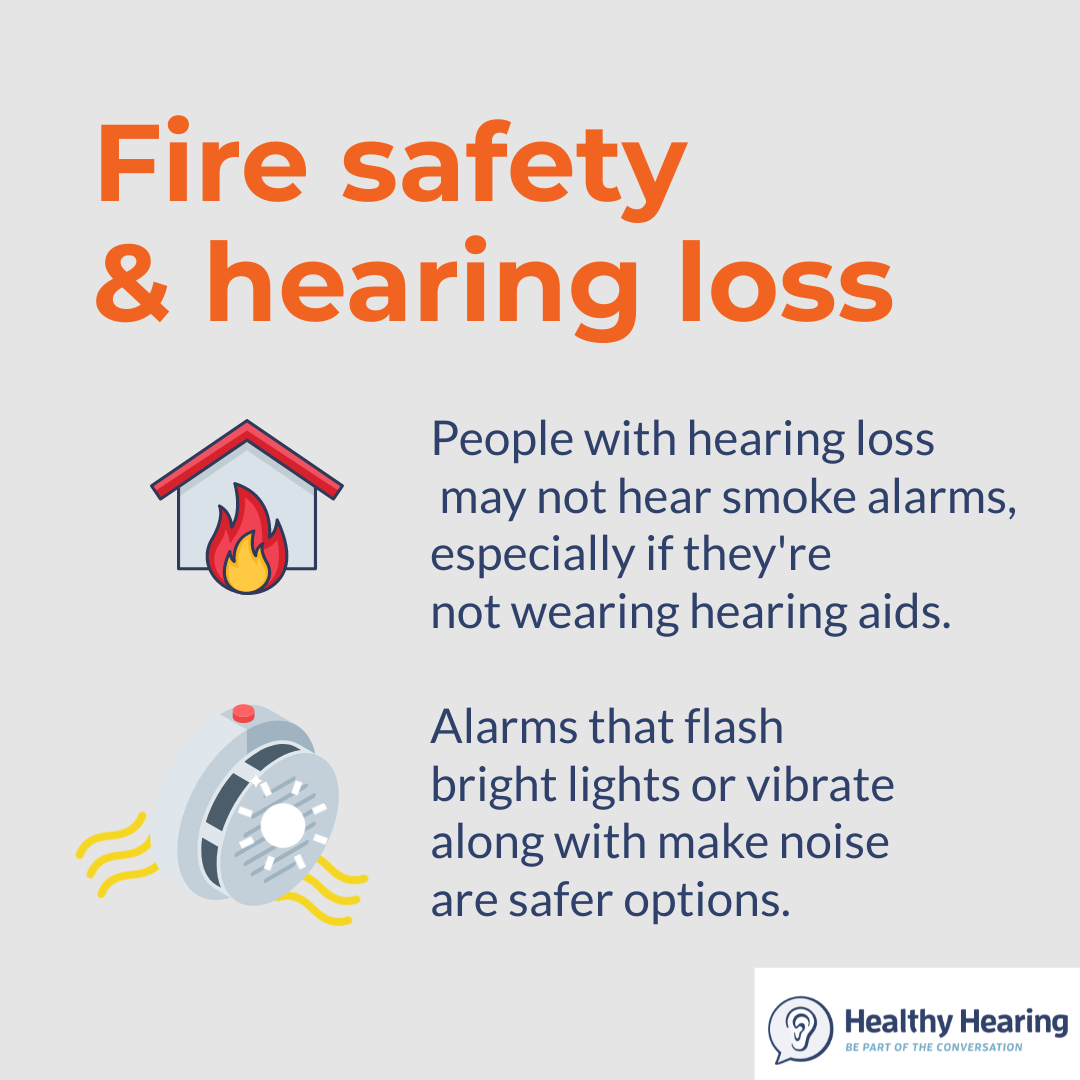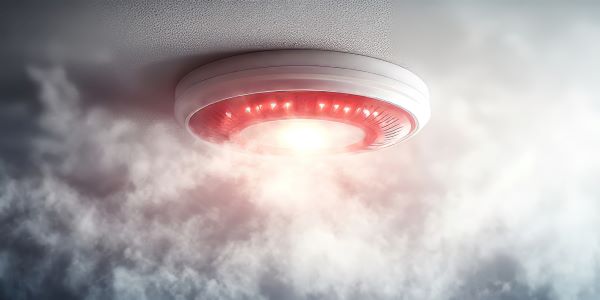Key points:
-
People with hearing loss may not be able to hear traditional smoke alarms, especially at night when not wearing hearing aids.
-
Alarms that use strobe lights, vibrations or a combination of these can help alert those with hearing difficulties.
-
Make sure to buy your smoke detectors from a reputable company and have more than one in your home for optimal safety.
Having a smoke detector in your home is a simple and effective way to stay safe: Your risk of dying at home in a fire is cut in half when there’s a working smoke alarm present, per the National Fire Protection Association (NFPA).
For many people, the attention-grabbing blare of a fire alarm is all you need. However, if you have hearing loss, the din of these life-saving devices may not be an effective alert to the presence of smoke, fire or carbon monoxide.

Thankfully, alarms with flashing lights, as well as special vibrating alarms designed to wake someone who’s sleeping, are available for people who are deaf or have a hearing impairment.
Are people with hearing loss at increased risk during fires?
Yes, people with hearing loss are at a higher risk of being harmed in fires, due to the fact that standard smoke alarm sounds are often higher-pitched making them more difficult to hear for many with high-frequency sensorineural hearing loss.
“The risk of a normal alarm is that some produce only a high-frequency sound, and some do not produce an alarm loud enough for [people with] a severe to profound hearing loss to pick up,” says Nevada audiologist Rich Panelli.
This is particularly significant at night, when people are likely to remove their hearing aids.
“NFPA advises that older adults or other people who are hard of hearing (those with mild to severe hearing loss) use a device that emits a mixed, low-pitched sound,” says Sharon Cooksey, a fire safety educator at Kidde, an alarm manufacturer.
Choosing the right smoke alarm for your hearing loss
If you or a loved one in your home has trouble hearing, consider looking for smoke detectors with one or more of the following features:
- Strobe lights: Instead of relying simply on sound, the flash from strobe alarms gives a visual cue about dangers. If you’re counting on a strobe alarm for nighttime, when you might be asleep, look for one that has an intensity high enough to wake someone up, advises the NFPA. And be aware that older adults may be less responsive to strobe alarms, Cooksey points out.
- Vibration: Sleeping is a particularly high-risk time when it comes to fires. Alarms that make the pillow or bed vibrate (often referred to as “bed shakers”) help wake people up.
- Interconnected alarms: “Alarms that cater to someone with severe to profound hearing loss include a combination of alerting devices, usually in one system,” Panelli says. With this system, when one alarm goes off, all of them do—the bed shakes, lights flash, sounds blare, and so on.

consider replacing it with a unit that also flashes light, or
a bed shaker alarm.
Top smoke alarms for people with hearing loss
To help you in your search, we did some research and put together a brief list of popular, reputable companies that offer smoke alarms and alerting devices for people with hearing impairments.
These brands stand out because they combine known effective features for people with hearing loss, and are available through trusted retailers and distributors.
- First Alert Hardwired LED Strobe Light Smoke Alarm. A popular and widely available choice, this alarm uses lower frequency sounds and employs a Smart Strobe light that flashes distinctive flash patterns to distinguish between smoke and carbon monoxide.
- Bellman & Symfon. This company offers several different hearing loss friendly alarm options that utilize flashing lights, vibrating watches, and bed shakers.
- Lifetone HL. While this device is not a smoke detector, it uses patented technology to detect when your smoke alarm is beeping. Once it hears the smoke alarm it emits its own loud, pulsing, low-frequency alarm. It also comes with a vibrating pad that can be placed under your pillow or mattress, and the unit (which looks similar to an alarm clock) will flash “FIRE” on the display screen.
Whichever alarm system you select, make sure everyone in the house knows what signal to expect (whether it’s light, sound, vibration, or a combo), Cooksey recommends.
Other things to consider when choosing a fire alarm
- You need more than one. If you have several floors, you’ll need an alarm in each level (except for the attic), Cooksey says. Make sure to have one in every bedroom, she says.
- You’ll need to test them regularly. That way, you’ll know the alarm is working. Cooksey recommends a weekly test.
- Make sure the alarm is reputable. “Always look for alarms that have the label of a recognized testing laboratory, such as UL,” Cooksey recommends. You’ll find alarms that meet the UL standards for people who are deaf or hard of hearing from BRK Electronics, Gentex Corporation, Kidde Fire Safety, and Menards, Inc., notes the NFPA.
Note: This guidance is for households. People who own businesses like hotels must follow ADA laws.
What about CO detectors for people with hearing loss?
Carbon monoxide, or CO, is a colorless, odorless gas produced from fossil-burning fuels used in furnaces, boilers, water heaters and fireplaces. Depending upon where you live, state or city laws may require you to have a working CO detector installed in your home. Even if they don't, it's a good idea to have one. Experts recommend installing a CO detector at least 15 feet from the entrance of each bedroom as well as one on every level of your home.
Carbon monoxide detectors are available with strobe lights and vibrating devices. NFPA codes also apply to these devices, which means these appliances must emit a loud, low-frequency signal.
Need to get your hearing tested?
Since most cases of hearing loss come on gradually, you might not know if you could benefit from a smoke or carbon monoxide alarm with these additional features.
If you are noticing any trouble following conversations, or if you are over 60 or regularly exposed to loud noise, a simple hearing test can help determine whether or not you may need assistance to stay safe and hear your best.
To find a provider and get your hearing tested, check out our directory to find providers in your area.
More: Learn about other alerting devices that can keep you safe.
The above is the interpretation of The Best Smoke Alarms for Deaf and Hard of Hearing provided by Chinese hearing aid supplier Shenrui Medical. Link https://www.srmcm.com/Blog/The_Best_Smoke_Alarms_for_Deaf_and_Hard_of_Hearing.html of this article is welcome to share and forward. For more hearing aid related information, please visit Blog or take a look at our Hearing aids products















